- Home
- Nicholas Sparks
The Wish Page 6
The Wish Read online
Page 6
“Super,” I said, but all I really wanted was to pull the covers over my head in the hope of making her leave. But it wasn’t necessary; Aunt Linda turned away. A moment later, I heard her bedroom door close, and I knew that I’d be alone the rest of the night, with only my own dark thoughts to keep me company.
* * *
As miserable as the rest of the week was, Sundays were the absolute worst. Back in Seattle, I didn’t really mind going to church because there was a family there named the Taylors with four boys, all of them from one to a few years older than me. They were boy-band perfect, with white teeth and hair that always looked blow-dried. Like us, they sat in the front row—they were always on the left while we were on the right—and I’d sneak peeks at them even when I was supposed to be praying. I couldn’t help it. I’d had a massive crush on one or the other pretty much as long as I could remember, even though I never actually spoke to any of them. Morgan had better luck; Danny Taylor, one of the middle ones, who at the time was also a pretty good soccer player, took her out for ice cream one Sunday after church. I was in eighth grade at the time and desperately jealous that he’d asked her, not me. I remember sitting in my room and staring at the clock, watching the minutes pass; when Morgan finally got home, I begged her to tell me what Danny was like. Morgan, being Morgan, simply shrugged and said that he wasn’t her type, which made me want to strangle her. Morgan had guys practically drooling if she so much as walked down the sidewalk or sipped a Diet Coke in the food court at the local mall.
The point is, back home there was something interesting to see at church—more specifically, four very cute somethings—and that made the hour pass quickly. Here, though, church was not only a chore but an all-day event. There was no Catholic church in Ocracoke; the nearest one was St. Egbert’s in Morehead City, and that meant catching the ferry at seven in the morning. The ferry generally took two and a half hours to reach Cedar Island, and from there, it was another forty minutes to the church itself. The service was at eleven, which meant we had to wait yet another hour for it to begin, and the mass lasted until noon. If that wasn’t bad enough, the ferry back to Ocracoke didn’t leave until four in the afternoon, which meant killing even more time.
Oh, we’d have lunch with Gwen afterward, since she always came with us. Like my aunt, she also used to be a nun, and she considered attending services on Sundays the highlight of her week. She was nice and all, but ask any teenager how much they enjoy eating lunch with a couple of fifty-odd-year-old former nuns, and you can probably guess what it was like. After that, we’d go shopping, but it wasn’t fun shopping like at the mall or the Seattle waterfront. Instead, they’d drag me to Wal-Mart for supplies—think flour, shortening, eggs, bacon, sausage, cheese, buttermilk, various flavored coffees, and other baking stuff in bulk—and after that, we’d visit garage sales, where they would search for inexpensive books by best-selling authors and movies on videocassette that they could rent to people on Ocracoke. Added to the late-afternoon ferry ride, all of that meant that we wouldn’t get back to the house until almost seven, when the sun had long since set.
Twelve hours. Twelve long hours. Just so we could go to church.
There are, by the way, about a million better ways to spend a Sunday, but lo and behold, as Sunday morning dawned, I found myself standing at the dock in a jacket zipped to my chin, stamping one foot and then the other while the frigid air made it appear as though I were smoking invisible cigarettes. Meanwhile, my aunt and Gwen were whispering to each other and laughing and looking happy, probably because they weren’t slinging biscuits and serving coffee before the crack of dawn. When it was time, my aunt pulled her car onto the ferry, where it crammed alongside about a dozen others.
I wish I could say that the ride was either pleasant or interesting, but it wasn’t, especially in winter. Unless you enjoyed staring at gray skies and even grayer water, there was nothing to see, and if the dock had been freezing, riding on the ferry was fifty times worse. The wind seemed to blow right through me and after less than five minutes outside, my nose started running and my ears turned bright red. There was, thank God, a large central cabin on the ferry where you could escape the weather, complete with a couple of vending machines offering snacks and places to sit, which was where Gwen and my aunt hung out. As for me, I crawled into the car and stretched out on the back seat, wishing I were anywhere else and thinking about the mess I’d gotten myself into.
The day after my mom had me pee on a stick, she brought me to see Dr. Bobbi, who was maybe ten years older than my mom, and the first nonpediatrician I’d ever seen. Dr. Bobbi’s real name was Roberta, and she was an OB-GYN. She’d delivered both my sister and me, so she and my mom went way back, and I’m pretty sure my mom was mortified by the reason for our visit. After Dr. Bobbi confirmed the pregnancy, she set me up with an ultrasound, to make sure the baby was healthy. I pulled up my shirt, one of the technicians put some goop on my tummy, and I was able to hear the heartbeat. It was both cool and utterly terrifying, but what I remember most was how surreal it felt and how much I wished that all of it was just a bad dream.
But it wasn’t a dream. Because I was Catholic, abortion wasn’t even an option, and once we learned the baby was healthy, Dr. Bobbi gave us the talk. She assured both of us that I was more than mature enough physically to carry the baby to term, but emotions were a different story. She said I was going to need a lot of support, partly because the pregnancy was unexpected, but mainly because I was still a teenager. In addition to feeling depressed, I might feel angry and disappointed as well. Dr. Bobbi warned that I was also likely to feel alienated from friends, making everything harder. Had I been able to check in with Dr. Bobbi now, I would have told her, check, check, check, and check.
With the talk ringing in her ears, my mom brought me to a support group for pregnant teenagers in Portland, Oregon. I’m sure there were the same kinds of support groups in Seattle, but I didn’t want anyone I knew to accidentally find out, and my parents didn’t want that, either. So, after almost three hours in the car, I found myself in a back room at a YMCA, where I sat in one of the fold-out chairs that had been arranged in a circle. There were nine other girls there, and some of them looked like they were attempting to smuggle watermelons by hiding them under their shirts. The lady in charge, Mrs. Walker, was a social worker, and one by one, we introduced ourselves. After that, we were all supposed to talk about our feelings and our experiences. What actually happened was that the other girls talked about their feelings and experiences, while I simply listened.
Really, it was just about the most depressing thing ever. One of the girls, who was even younger than me, talked about how bad her hemorrhoids had gotten, while another one droned on about how sore her nipples were before lifting her shirt to show us her stretch marks. Most but not all of them continued to attend their various high schools, and they talked about how embarrassed they were when they had to ask their teacher for a hall pass to go to the bathroom, sometimes two or three times during the same class period. All of them complained how their acne had gotten worse. Two of them had dropped out, and though both said they planned to go back to school, I’m not sure anyone believed them. All had lost friends, and another had been kicked out of her house and was living with her grandparents. Only one of them—a pretty Mexican girl named Sereta—still spoke with the father of the child, and aside from her, none intended to marry. Except for me, all of them planned to raise their babies with the help of their parents.
When it was over, as we were walking toward the car, I told my mom that I never wanted to do something like that again. It was supposed to be helpful and make me feel less alone, but it left me feeling exactly the opposite. What I wanted was to simply get through this so I could return to the life I had before, which was the same thing my parents wanted. That, of course, led to them making the decision to send me here, and though they assured me that it was for my own good—not theirs—I wasn’t sure I believed them.
* * *
After church, Aunt Linda and Gwen dragged me through the lunch/shop-for-supplies/garage-sales routine before heading to a graveled lot near a hardware store, which held so many Christmas trees for sale that it resembled a miniature forest. My aunt and Gwen tried to make the experience fun for me and kept asking my opinion; for my part, I did a lot of shrugging and told them to pick whatever they wanted, since no one seemed to care what I thought anyway, at least when it came to decisions about my life.
Somewhere around the sixth or seventh tree, Aunt Linda stopped asking, and they eventually made the selection without me. Once it was paid for, I watched as two guys wearing overalls tied the tree to the roof of the car, and we climbed back in.
For whatever reason, the ride back to the ferry reminded me of the ride to the airport on my last morning in Seattle. Both my mom and my dad had seen me off, which was kind of a surprise, since my dad had barely been able to look at me since he’d learned I was pregnant. They walked me to the gate and waited with me until it was time to board. Both of them were really quiet, and I wasn’t saying much, either. But as time inched forward toward the departure, I remember telling my mom that I was afraid. In truth, I was terrified to the point that my hands had begun to shake.
There were a lot of people around us and she must have noticed the trembling, because she took my hands and squeezed them. Then she led me to a less crowded gate, where we could have some privacy.
“I’m afraid, too.”
“Why are you afraid?” I asked.
“Because you’re my daughter. All I do is worry about you. And what happened is…unfortunate.”
Unfortunate. She’d been using that word a lot lately. Next, she’d remind me that leaving was for my own good.
“I don’t want to go,” I said.
“We’ve talked about this,” she said. “You know it’s for your own good.”
Bingo.
“I don’t want to leave my friends.” By that point, it was all I could do to choke out the words. “What if Aunt Linda hates me? What if I get sick and I have to go to the hospital? They don’t even have a hospital there.”
“Your friends will still be here when you get back,” she assured me. “And I know it seems like a long time, but May will come more quickly than you realize. As for Linda, she used to help pregnant girls just like you when she was at the convent. You remember when I told you that? She’ll take care of you. I promise.”
“I don’t even know her.”
“She has a good heart,” my mom said, “or you wouldn’t be going there. As for the hospital, she’ll know what to do. But even in the worst-case scenario, her friend Gwen is a trained midwife. She’s delivered lots of babies.”
I wasn’t sure that made me feel any better.
“What if I hate it there?”
“How bad can it be? It’s right on the beach. And besides, you remember our discussion, right? That it might be easier in the short run if you stay, but in the long run, it will surely make things harder for you.”
She meant gossip, not only about me but about my family as well. It might not be the 1950s, but there was still a stigma attached to unwed teenage pregnancies, and even I had to admit that sixteen was way too young to be a mom. If word got out, I would always be that girl to neighbors, other students at school, the people at church. To them, I’d always be that girl who got knocked up after her freshman year. I would have to endure their judgmental stares and condescension; I’d have to ignore their whispers as I walked past them in the hallways. The rumor mill would churn with questions about who adopted the baby, about whether I ever wanted to see the child again. Though they might not say it to me, they would wonder why I hadn’t bothered to use birth control or insist that he wear a condom; I knew that many parents—including friends of the family—would use me as an example to their own children as that girl, the one who’d made poor decisions. And all this while waddling the school hallways and having to pee every ten minutes.
Oh yeah, my parents had spoken with me about all of it more than a few times. My mom could tell, though, that I didn’t want to revisit it, so she changed the subject. She did that a lot when she didn’t want to argue, especially when we were in public.
“Did you enjoy your birthday?”
“It was okay.”
“Just okay?”
“I barfed all morning. It was kind of hard for me to get excited.”
My mom brought her hands together. “I’m still glad you had a chance to visit with your friends.”
Because it’s the last time you’ll see them for a long, long time, she didn’t have to add. “I can’t believe I’m not going to be home for Christmas.”
“I’m sure Aunt Linda will make it special.”
“It still won’t be the same,” I whined.
“No,” my mom admitted. “It probably won’t be. But we’ll have a nice visit when I see you in January.”
“Will Daddy come?”
She swallowed. “Maybe,” she said.
Which also means maybe not, I thought. I’d heard them talking about it, but my dad hadn’t committed to anything. If he could barely look at me now, how would he feel when I was doing my best to impersonate a female Buddha?
“I wish I didn’t have to go.”
“Me too,” she said. “Do you want to visit with your dad for a while?”
Shouldn’t you be asking him if he wants to visit with me? But again, I kept quiet. I mean, what was the point? “It’s okay,” I said. “I just…”
When I trailed off, my mom offered a sympathetic expression. And, strangely, despite the fact that she and my dad were shipping me off, I had the sense she actually felt bad about it.
“I know there’s nothing easy about any of this,” she whispered.
Surprising me, she reached into her purse and handed me an envelope. It was filled with cash, and I wondered whether my dad knew what she was doing. It’s not as though my family had extra money lying around, but she didn’t try to explain. Instead, we sat together for another few minutes until we heard the boarding announcement. When it was my turn, both my parents hugged me, but even then, my father glanced away.
That was almost a month ago, but it already felt like a different life entirely.
* * *
It wasn’t nearly as cold on the ferry back as it had been in the morning, and the gray skies had given way to an almost shiny blue. I’d chosen to stay in the car for a while despite the fact that the supplies we’d picked up made stretching out on the back seat impossible. I was trying to play the martyr as neither Aunt Linda nor Gwen seemed to understand that Christmas tree shopping notwithstanding, Sundays were still the worst.
“Suit yourself,” my aunt had said with a shrug after I’d declined their offer to join them in the cabin. She and Gwen had hopped out of the car, climbed the steps that led to the upper level, and quickly vanished from sight. Somehow, even though I was uncomfortable, I was able to fall asleep, finally waking after an hour. Turning on my Walkman, I listened to music for another hour until my batteries finally went dead and the sky turned to black, and after that, it wasn’t long before I grew cramped and bored. Through the window, beneath the glowing ferry lights, I could see a few older men congregated outside their cars, looking exactly like the fishermen they probably were. Like my aunt and Gwen, they eventually made their way to the cabin.
I shifted in the seat and realized that nature was calling. Again. For the sixth or seventh time that day, even though I’d barely had anything to drink. I’ve forgotten to mention that my bladder had suddenly transformed from something I hardly ever thought about into a hypersensitive and highly inconvenient organ, one that made knowing exactly where to find a bathroom imperative at all times. Without warning, the cells in my bladder would suddenly start vibrating hysterically with the message You’ve got to empty me right this very second or else!, and I’d learned that I didn’t have a choice in the matter. Or else! If Shakespeare had tried to describe the urgency
of the situation, he probably would have written, To pee or not to pee…that is NEVER the question.
I scrambled out of the car, hurried up the steps and into the cabin, where I vaguely noticed my aunt and Gwen chatting with someone at one of the booths. I quickly found the bathroom—thankfully, it was unoccupied—and on my way back out, Aunt Linda motioned for me to join them. Instead, I ducked my head and exited the cabin. The last thing I wanted was another conversation with adults. My first instinct after descending the steps was to head back to the car. But the martyrdom wasn’t working and the batteries in my Walkman had died, so what was the point? Instead, I decided to explore, thinking it would kill some time. I figured I had probably half an hour to go until the ferry docked—I could already see the lights of Ocracoke in the distance—but unfortunately, the tour wasn’t much more interesting than the Pamlico Sound. There was the aforementioned cabin in the center, cars parked on the deck below, and what I guessed was the control room where the captain sat above the cabin, which was off-limits. I did notice, however, a few empty benches toward the front of the boat, and with nothing better to do I made my way there.
It didn’t take long to figure out why they were empty. The air was icy, the wind felt like it was stabbing my skin with little needles, and even though I buried my hands in the pockets of my jacket, I could still feel them tingling. On either side, I noticed small breakers in the dark ocean water, little flashes that seemed to sparkle, but the sight of those tiny waves made me think about him, even though I didn’t want to.
J. The boy who got me into this mess.
What can I tell you about him? He was a seventeen-year-old surfer from Southern California with beachy good looks, who’d spent the summer in Seattle with a cousin who happened to be a friend of one of my friends. I first saw him at a little get-together in late June, but don’t start thinking it was one of those kinds of parties with absent parents and rivers of booze and marijuana smoke drifting from beneath bedroom doors. My parents would have killed me. It wasn’t even at a house—it was at Lake Sammamish—and my friend Jodie was a friend of the cousin, who brought J along. Jodie convinced me to go, even though I wasn’t sure I wanted to, but once I arrived, it took me all of about two seconds to notice him. He had longish blond hair, broad shoulders, and a deep tan, which was almost impossible for me to attain; my skin preferred to mimic a bright red apple when exposed to the sun. Even from a distance, I could see every single muscle in his stomach, like he was some sort of living human anatomy display.

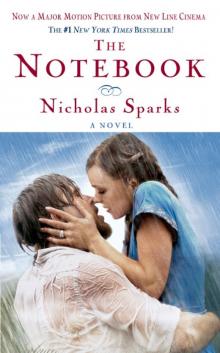 The Notebook
The Notebook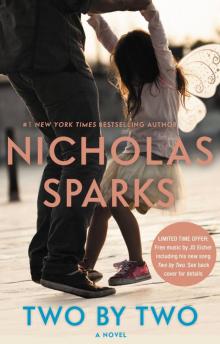 Two by Two
Two by Two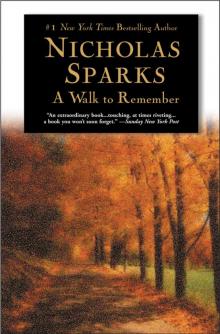 A Walk to Remember
A Walk to Remember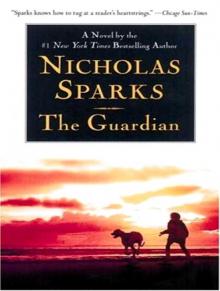 The Guardian
The Guardian Dear John
Dear John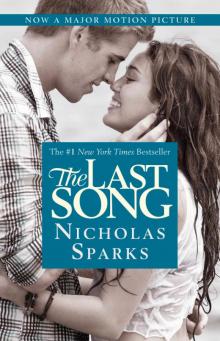 The Last Song
The Last Song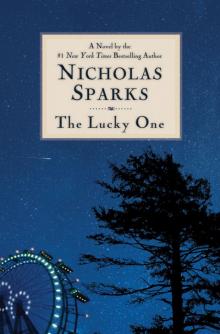 The Lucky One
The Lucky One The Wedding
The Wedding The Longest Ride
The Longest Ride Safe Haven
Safe Haven The Rescue
The Rescue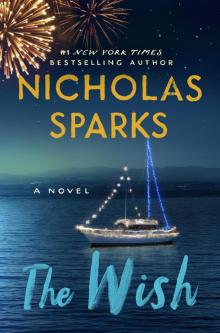 The Wish
The Wish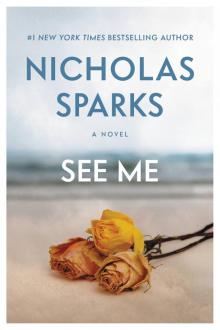 See Me
See Me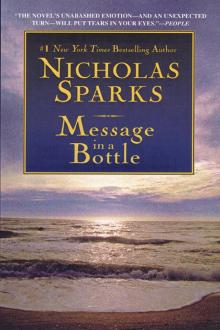 Message in a Bottle
Message in a Bottle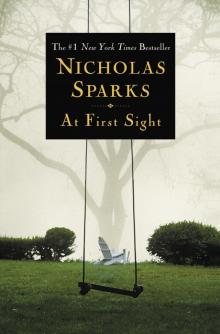 At First Sight
At First Sight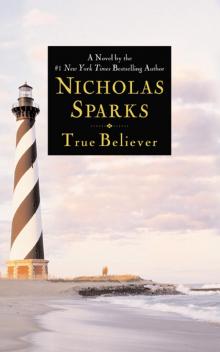 True Believer
True Believer The Return
The Return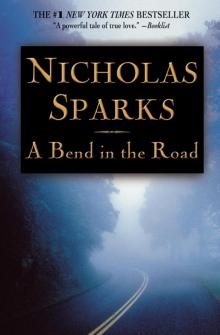 A Bend in the Road
A Bend in the Road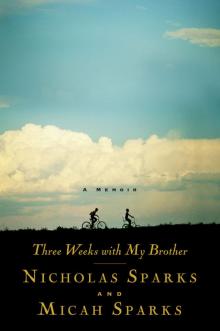 Three Weeks With My Brother
Three Weeks With My Brother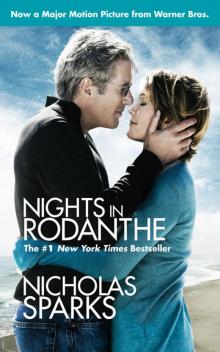 Nights in Rodanthe
Nights in Rodanthe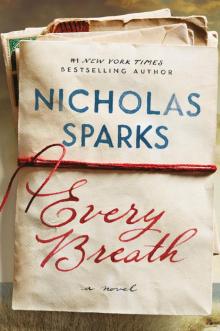 Every Breath
Every Breath